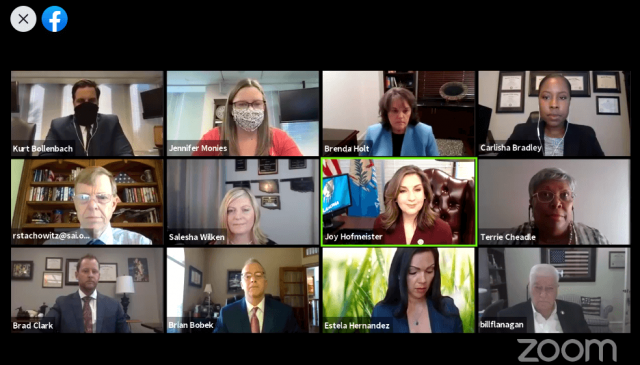

During a special meeting of the Oklahoma State Board of Education today, members unanimously approved a motion to demand Epic Charter Schools One-on-One and Epic Blended return $11,235,919 to the State Department of Education.
The money represents alleged over-expenditures on administrative costs and state dollars used for development expenses in California, as detailed by an audit from the Oklahoma State Auditor and Inspector’s Office. The board’s motion said Epic must comply within 60 days of receiving related paperwork.
“We have, as a state board, a duty to recoup those funds,” State Superintendent Joy Hofmeister said during the meeting.
The audit of Epic Charter Schools was initially released Oct. 1 and said that Epic owes Oklahoma $8.9 million after violating state law that limits the amount of money that can be spent on administrative costs with a 5 percent cap. The audit also said Epic had used Oklahoma tax dollars to fund Epic Charter Schools California.
During a nearly four-hour meeting, deputy director of the special investigative unit of the State Auditor’s office Brenda Holt presented the audit findings to the board. That included the $8.9 million, as well as $2.6 million in prior administrative costs and $203,000 from the Learning Fund that had been transferred to Epic California.
“This audit is not about charter schools, it’s not about school choice,” Holt said. “It’s strictly reporting on the management of Epic Schools and related financial activity.”
Also on Monday, Oklahoma Attorney General Mike Hunter appointed special counsel Melissa McLawhorn Houston to review the audit of Epic.
Response: ‘Epic is not perfect’
In a press release, Epic offered a response to the Board of Education meeting. Epic Superintendent Bart Banfield defended the virtual schools.
“It’s no secret we dispute some of the [state auditor’s] material findings and have requested through an open records request its work papers to review their calculations so we can go beyond our initial audit response to exercise our due process and debunk these calculations,” Banfield said. “Epic is not perfect. No school is. But the dedication of Epic’s 2,100 employees working here to get things right and improve our processes is. We know more than 60,000 students and their families are counting on us to work with the State Department of Education to resolve issues and we will not let them down.”
Blurred lines
The state auditor’s report also mentioned a lack of proper oversight and accountability over the spending of public funds for the charter school. Holt said all of Epic’s audits and reviews had been previously completed by an independent auditor.
Epic is accountable to three entities, including the State Department of Education. Epic’s schools are sponsored by Rose State College (Epic Blended) and the Oklahoma Statewide Virtual Charter School Board (Epic One-on-One). Epic also is governed by Community Strategies, which acts as Epic’s school board and has ultimate jurisdiction over the transactions of the district.
“Oversight as a whole was weak,” Holt said. “There was very little verification of the underlying documentation of Epic. Information was taken at face value.”
Holt said that while Community Strategies has main oversight responsibility as the district’s school board, members did not review certain transactions or documentation, such as purchase orders, invoices or bank statements.
“Most of their transactions, if not all, are reviewed on a consent agenda after the fact,” Holt said.
The board also only meets quarterly and has poor attendance records. Holt cited one board member who only attended 31 percent of all of the meetings held in a five-year period along with another member who only attended 56 percent of the four yearly meetings.
“When you’re only meeting four times a year and then you miss two or three of those meetings, the oversight is very poor,” Holt said. “There was not one meeting in five years that all five members attended. That to us is not appropriate oversight for this board.”
In the oversight of Epic Blended, Holt said that Rose State College leaders admitted that they had offered basically no oversight other than reviewing independent audits.
“The virtual board did have policies in place to define their oversight. They did some onsite reviewing, but they also heavily relied on outside reports,” Holt said. “Although they did have some good processes in place, it probably just wasn’t enough as far as the in-depth review of the actual records and supporting information.”
The Oklahoma Statewide Virtual Charter School Board will be meeting Tuesday and could possibly vote on terminating it’s charter contract with Epic One-on-One.
Big news: The Oklahoma Statewide Virtual Charter School Board could vote tomorrow on possibly terminating it’s charter contract with Epic One-on-One. pic.twitter.com/vYNgFok7B6
— Nuria Martinez-Keel (@NuriaMKeel) October 12, 2020
While Epic’s independent financial audit states that board members are nominated by the public, the State Auditor & Inspector’s Office found no evidence that members were ever nominated by the public.
Inaugural board members were named by Epic founders and Epic Youth Services owners David Chaney and Ben Harris. Two individuals that have been approved as new board members since 2013 have no documented nomination process.
“Lines are very blurred between Community Strategies, Epic Charter Schools and Epic Youth Services,” Holt said.
Advertising costs
The audit also found that Epic spent more than $2.6 million on advertising in four months. While there is no state law prohibiting the use of those appropriations for advertising, the audit found “the significance of an expenditure of this magnitude questionable.”
“In our opinion $2.6 million in advertising over a four month period, I think in any bodies Oklahoma budget, is excessive,” Holt said. “Especially considering the questionable and constant funding needs in education, to spend that type of money on advertising for one school district seems inappropriate, in our opinion.”
Part of this advertising campaign included Epic signing $525,000 in contracts with Penn Square Mall and Woodland Hills Mall in Oklahoma City and Tulsa for $525,000 for promotional playgrounds.
“We were told by Epic that these were for physical fitness and instructional programming use and that all large Oklahoma school districts and charter schools have playgrounds,” Holt said.
In signing these multi-year contracts, Holt said Epic violated Article 10, Section 26 of the Oklahoma Constitution.
“It’s not that you can’t have a multi-year contract, but those contracts have to have a cancellation clause in them and these did not,” Holt said.
The audit suggests the state strongly consider consolidating charter school authorization, sponsorship and oversight under one agency providing a comprehensive oversight strategy while reducing overall costs and increasing funds available for use in the classroom.




















